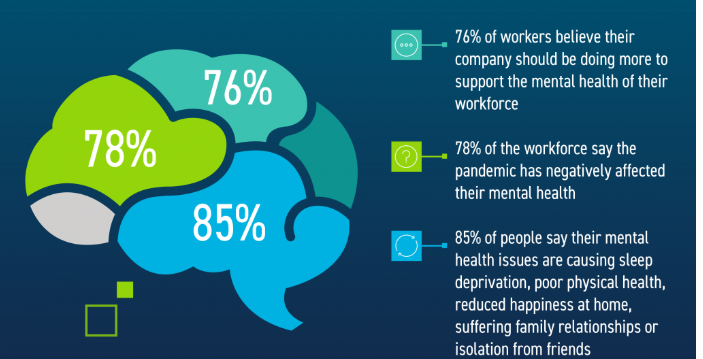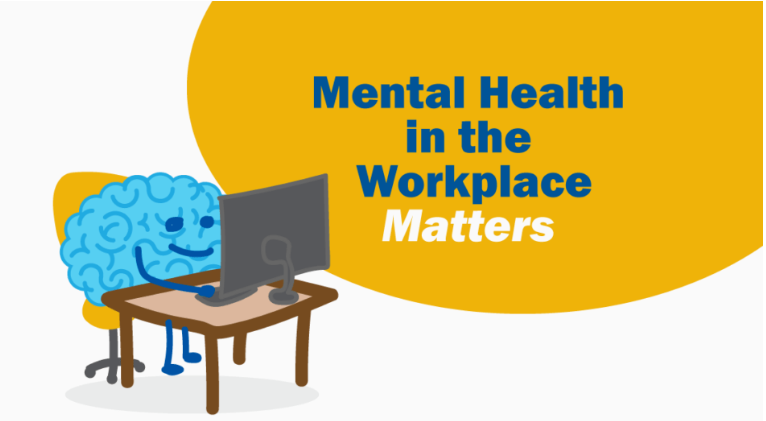“Mental Health Matters: How to Foster a Positive, Stress-Free Workplace”
In today’s competitive work environment, mental health is becoming an increasingly important topic. With the fast pace of modern work life, many employees face mental health challenges such as stress, anxiety, and burnout. These issues not only affect employees’ well-being but also impact workplace productivity, morale, and overall company performance. It is crucial for employers to address mental health at work and provide support to create a healthier, more productive work environment.

Why Mental Health Matters at the Workplace
Workplace mental health is critical because it directly affects employee performance, job satisfaction, and retention rates. When mental health is neglected, employees may experience fatigue, stress, and lack of motivation. This can lead to absenteeism, lower productivity, and even higher turnover rates. According to the World Health Organization, depression and anxiety disorders alone cost the global economy about $1 trillion each year in lost productivity.
Mental health challenges can also lead to poor decision-making, lack of focus, and difficulty completing tasks. In the long run, these issues may create a toxic environment, which makes employees feel disconnected and disengaged from their work. For businesses, the overall cost of ignoring mental health can be high, affecting team collaboration, company culture, and even profit.

Common Workplace Mental Health Issues
There are several common mental health issues that employees might face, including:
- Stress: Job-related stress is one of the most common mental health issues. This can be caused by tight deadlines, excessive workloads, or poor management. Chronic stress can lead to burnout, a state of emotional, physical, and mental exhaustion.
- Anxiety: Many employees experience anxiety about job security, performance expectations, or interpersonal conflicts. Anxiety can cause feelings of fear, nervousness, and physical symptoms like racing heartbeats or difficulty breathing.
- Depression: Depression can make employees feel unmotivated, tired, and disconnected from their work. This can affect their productivity and their ability to interact with colleagues.
- Burnout: This is a state of extreme exhaustion, often caused by overwork, lack of control, and insufficient support. Burnout leads to emotional exhaustion, reduced performance, and a sense of hopelessness.
The Importance of Addressing Mental Health at Work
Addressing mental health at work not only benefits employees but also helps the organization as a whole. When companies create a supportive environment, employees are more likely to feel valued, productive, and engaged in their work. Mental health support can also improve employee retention rates and help to avoid costly turnover and recruitment processes.
In addition, mental health initiatives help to foster a more inclusive, supportive workplace culture. By prioritizing mental well-being, organizations can build stronger teams and increase job satisfaction.
Solutions to Improve Mental Health in the Workplace

Fortunately, there are many practical steps that employers can take to support mental health in the workplace. Here are some effective strategies:
- Open Communication
Creating an open and supportive communication culture is essential. Employees should feel comfortable discussing mental health issues without fear of judgment. Employers can promote mental health awareness through training programs and encourage employees to speak up about any challenges they may be facing. Open conversations can help reduce the stigma around mental health and create a more understanding work environment.
- Offer Employee Assistance Programs (EAPs)
Employee Assistance Programs (EAPs) are valuable resources that offer confidential support for employees dealing with mental health problems. These programs can provide counseling services, help employees manage stress, and offer resources for managing personal or work-related problems. Providing access to such programs ensures that employees have the support they need to cope with mental health challenges.
- Encourage Work-Life Balance
A healthy work-life balance is critical for mental health. Employers can promote balance by offering flexible working hours or remote work options. Encouraging employees to take regular breaks, use vacation days, and disconnect after work hours helps reduce stress and prevent burnout. Employers should set realistic expectations to avoid overwhelming employees with excessive tasks.
- Foster a Positive Work Environment
Creating a positive work culture can go a long way in improving mental health. Employers should promote teamwork, respect, and inclusivity. Recognizing employees’ hard work and achievements helps improve morale and motivates them to continue performing well. Additionally, employers can provide regular feedback and support, showing that they value their employees’ contributions.
- Provide Mental Health Days
Just as employees take sick days for physical illness, they should also have access to mental health days. Mental health days allow employees to recharge and manage stress before it becomes overwhelming. Offering mental health days shows employees that their well-being is a priority and helps prevent long-term mental health issues.
- Training for Managers
Managers play a crucial role in supporting the mental health of their team members. By providing training on how to recognize signs of mental health issues and how to approach sensitive conversations, managers can create a more supportive work environment. Training should also include strategies for helping employees manage stress and workload.
- Promote Physical Wellness
Physical and mental health are closely connected. Encouraging employees to take care of their physical health can help improve their mental well-being. Employers can support physical wellness by offering gym memberships, organizing wellness programs, and providing healthy snacks. Physical activities like exercise can reduce stress and improve mood, benefiting both employees and the organization.
PREVIOUS ARTICLE :
How Does Negative Online Content Affect Your Mental Health? 5 Strategies for a Healthier Digital Diet

